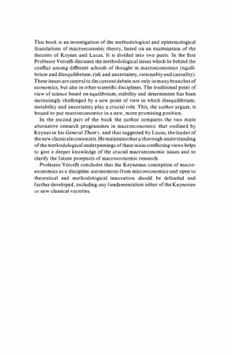Table Of ContentThis book is an investigation of the methodological and epistemological
foundations of macroeconomic theory, based on an examination of the
theories of Keynes and Lucas. It is divided into two parts. In the first
Professor Vercelli discusses the methodological issues which lie behind the
conflict among different schools of thought in macroeconomics (equili
brium and disequilibrium, risk and uncertainty, rationality and causality).
These issues are central to the current debate not only in many branches of
economics, but also in other scientific disciplines. The traditional point of
view of science based on equilibrium, stability and determinism has been
increasingly challenged by a new point of view in which disequilibrium,
instability and uncertainty play a crucial role. This, the author argues, is
bound to put macroeconomics in a new, more promising position.
In the second part of the book the author compares the two main
alternative research programmes in macroeconomics: that outlined by
Keynes in his General Theory, and that suggested by Lucas, the leader of
the new classical economists. He maintains that a thorough understanding
of the methodological underpinnings of these main conflicting views helps
to give a deeper knowledge of the crucial macroeconomic issues and to
clarify the future prospects of macroeconomic research.
Professor Vercelli concludes that the Keynesian conception of macro
economics as a discipline autonomous from microeconomics and open to
theoretical and methodological innovation should be defended and
further developed, excluding any fundamentalism either of the Keynesian
or new classical varieties.
Methodological foundations of macroeconomics: Keynes and
Lucas
Methodological foundations
of macroeconomics:
Keynes and Lucas
ALESSANDRO VERCELLI
Diparrimento di Economia Politica,
University of Siena
Ther igholf t M
Univ,,soiftC .a11m bridge
top ri1a1r11ds ell
almla nneorf lx:Jo J. J
M"O.f grarmb•yd
Hl!nrVyII I in/ j),,
The Uni,ershiorspy r inr1•1I
andp ublischoerrd1 inuou.sly
sinc/ej8 '.
CAMBRIDGE UNIVERSITY PRESS
Cambridge
New York Port Chester Melbourne Sydney
Published by the Press Syndicate of the University of Cambridge
The Pitt Building, Trumpington Street, Cambridge CB2 !RP
40 West 20th Street, New York, NY 10011-4211, USA
10 Stamford Road, Oakleigh, Melbourne 3166, Australia
©Cambridge University Press 1991
First published 1991
British Library cataloguing in publication data
Vercelli, Alessandro
Methodological foundations of macroeconomics: Keynes and
Lucas.
I. Macroeconomics. Theories
I. Title
339.301
Library of Congress cataloguing in publication data
Vercelli, Alessandro.
[Keynes dopo Lucas. English]
Methodological foundations of macroeconomics: Keynes and Lucas /
Alessandro Vercelli.
p. cm.
Translation with revisions of: Keynes dopo Lucas. I fondamenti
della macroeconomia, with four new chapters added.
Includes bibliographical references and index.
ISBN 0 521 39294 2
I. Keynes, John Maynard, 1883-1946. 2. Lucas, Robert E., Jr.
3. Macroeconomics. I. Title.
HB103.K47V3813 1991
339-dc20 90-36075 CIP
ISBN 0 521 39294 2 hardback
Transferred to digital printing 2003
SE
In memory of my parents
Contents
Preface page
Xlll
List of abbreviations
xv
In trodu cti on
I. I The crisis of macroeconomics I
I .2 Methodology and economics 2
1.3 Keynes and Lucas 3
I .4 Scientific paradigm and heuristic model 4
1.5 The structure of the book 6
Part I Methodological foundations of macroeconomics
2 Equilibrium, disequilibrium and economic theory 11
2.1 Introduction 11
2.2 The syntactic concept of equilibrium 12
2.3 The dynamic concept of equilibrium I2
2.4 Semantic concepts of equilibrium I4
2.5 The epistemic reasons for equilibrium 16
2.6 Relativity of the distinction between equilibrium and
disequilibrium 18
2.7 Paradoxes of a pure-equilibrium method 20
2.8 Conclusions 23
Appendix 2A Semantic interpretation of the solution procedure of
dynamic functional equations 23
Appendix 2B The concept of Nash equilibrium: a case study 27
3 Dynamic instability and economic models 30
3.1 Introduction 30
3.2 The dynamic behaviour of an economic system in
disequilibrium 3I
3.3 Dynamic instability in a stochastic framework 34
ix
Contents
3.4 Dynamic instability and structural change 35
3.5 Conclusions 38
Appendix 3A A general concept of dynamic instability 39
Appendix 3B Ergodic theory and economics 40
4 Structural instability and economic change 43
4.1 Introduction 43
4.2 The concept of structural stability: three views 44
4.3 Structural stability: relativity and degree 46
4.4 Structural instability: plausibility and observability 49
4.5 Structural stability and the methodology of empirical sciences 51
4.6 Conclusions 54
Appendix 4A A few operational concepts of structural instability 54
Appendix 4B Structural stability and the epistemology of change 56
4B.1 Equilibrium, stability and change in ancient Greece 57
4B.2 The 'modern' view of structural stability 60
4B.3 The topological definition of structural stability 62
4B.4 Structural stability in Thom 65
5 Uncertainty, predictability and flexibility 71
5.1 Introduction 71
5.2 'Uncertainty' versus 'risk' 72
5.3 The sources of regularity in human behaviour 79
5.4 Uncertainty and flexibility 82
5.5 Conclusions 84
Appendix 5A Decision theory and k-uncertainty 85
6 Rationality and expectations 91
6.1 Introduction 91
6.2 Rationality, dynamics and constraints 92
6.3 Rational expectations and equilibrium 97
6.4 Justifications of the hypothesis of rational expectations 99
6.5 The solution procedure of models with rational expectations:
indeterminacy and instability 100
6.6 Rational expectations and adaptive rationality 104
6. 7 Conclusions 104
7 Probabilistic causality and economic analysis: Suppes, Keynes,
CJranger 106
7 .1 Introduction I 06
7.2 Suppes's probabilistic causality 107
7.3 Suppes's theory of probabilistic causality: open questions and
glimpses beyond 111
7.4 Keynes and Suppes 114
7.5 Granger's probabilistic causality 116
x

